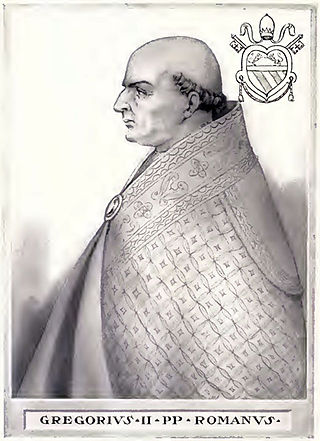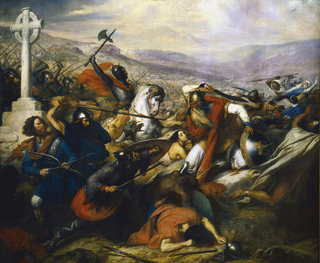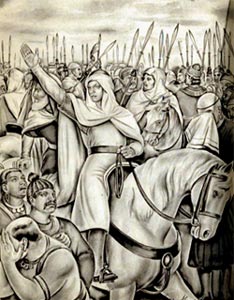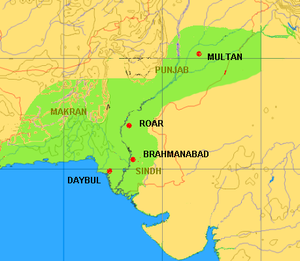
The 8th century is the period from 701 through 800 (DCCC) in accordance with the Julian Calendar.

Year 714 (DCCXIV) was a common year starting on Monday of the Julian calendar. The denomination 714 for this year has been used since the early medieval period, when the Anno Domini calendar era became the prevalent method in Europe for naming years.
The 720s decade ran from January 1, 720, to December 31, 729.
The 710s decade ran from January 1, 710, to December 31, 719.
The 700s decade ran from January 1, 700, to December 31, 709.
The 680s decade ran from January 1, 680, to December 31, 689.
The 690s decade ran from January 1, 690, to December 31, 699.
The 580s decade ran from January 1, 580, to December 31, 589.

Year 715 (DCCXV) was a common year starting on Tuesday of the Julian calendar. The denomination 715 for this year has been used since the early medieval period, when the Anno Domini calendar era became the prevalent method in Europe for naming years.

Year 720 (DCCXX) was a leap year starting on Monday of the Julian calendar. The denomination 720 for this year has been used since the early medieval period, when the Anno Domini calendar era became the prevalent method in Europe for naming years.

Year 687 (DCLXXXVII) was a common year starting on Tuesday of the Julian calendar. The denomination 687 for this year has been used since the early medieval period, when the Anno Domini calendar era became the prevalent method in Europe for naming years.

Year 712 (DCCXII) was a leap year starting on Friday of the Julian calendar, the 712th year of the Common Era (CE) and Anno Domini (AD) designations, the 712th year of the 1st millennium, the 12th year of the 8th century, and the 3rd year of the 710s decade. The denomination 712 for this year has been used since the early medieval period, when the Anno Domini calendar era became the prevalent method in Europe for naming years.

700 (DCC) was a leap year starting on Thursday of the Julian calendar, the 700th year of the Common Era (CE) and Anno Domini (AD) designations, the 700th year of the 1st millennium, the 100th and last year of the 7th century, and the 1st year of the 700s decade. As of the start of 700, the Gregorian calendar was 3 days ahead of the Julian calendar, which was the dominant calendar of the time.

Year 695 (DCXCV) was a common year starting on Friday of the Julian calendar. The denomination 695 for this year has been used since the early medieval period, when the Anno Domini calendar era became the prevalent method in Europe for naming years.

Year 730 (DCCXXX) was a common year starting on Sunday of the Julian calendar. The denomination 730 for this year has been used since the early medieval period, when the Anno Domini calendar era became the prevalent method in Europe for naming years.

The Battle of Guadalete was the first major battle of the Muslim conquest of the Iberian Peninsula, fought in 711 at an unidentified location in what is now southern Spain between the Visigoths under their king, Roderic, and the invading forces of the Umayyad Caliphate, composed mainly of Berbers and some Arabs under the commander Tariq ibn Ziyad. The battle was significant as the culmination of a series of Berber attacks and the beginning of al-Andalus. Roderic was killed in the battle, along with many members of the Visigothic nobility, opening the way for the capture of the Visigothic capital of Toledo.

Roderic was the Visigothic king in Hispania between 710 and 711. He is well known as "the last king of the Goths". He is actually an extremely obscure figure about whom little can be said with certainty. He was the last Goth to rule from Toledo, but not the last Gothic king, a distinction which belongs to Ardo.

The Muslim conquest of the Iberian Peninsula, also known as the Arab conquest of Spain, was the Umayyad conquest of the Visigothic Kingdom of Hispania in the early 8th century. The conquest resulted in the end of Christian rule in most of Iberia and the establishment of Muslim Arab-Moorish rule in that territory, which came to be known as al-Andalus, under the Umayyad dynasty.

The Umayyad invasion of Gaul, also known as the Islamic invasion of Gaul, refers to a series of military campaigns by Muslim forces to expand their territory into the region of Gaul, a continuation of the Umayyad conquest of the Iberian peninsula (711-726). The Umayyad invasion occurred in two phases, in 719 and 732 AD. Although the Umayyads secured control of Septimania, their incursions beyond this into the Loire and Rhône valleys failed. In 759, Muslim forces lost Septimania to the Christian Frankish Empire and retreated to the Iberian Peninsula which they called al-Andalus.
Julian, Count of Ceuta (Spanish: Don Julián, Conde de Ceuta,, Arabic: يليان, was, according to some sources, a renegade governor, possibly a former comes in Byzantine service in Ceuta and Tangiers who subsequently submitted to the king of Visigothic Spain before secretly allying with the Muslims. According to Arab chroniclers, Julian had an important role in the Umayyad conquest of Hispania, a key event in the history of Islam, and in the subsequent history of what were to become Spain and Portugal.













